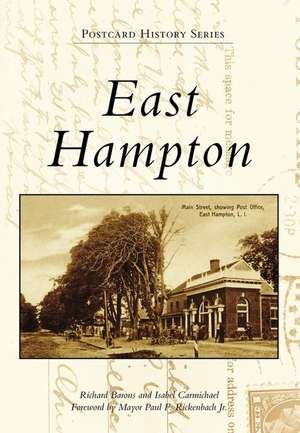East Hampton: Postcard History
Autor Richard Barons, Isabel Carmichael Mayor Paul F. Rickenbach Jren Limba Engleză Paperback – 29 mai 2016
Discover how East Hampton evolved from a fishing and farming community in the 1600s to a popular summer destination by the late 18th century.
Within a year of its construction in 1796, the Montauk Lighthouse was already attracting tourists to East Hampton. By the mid-19th century, steamships and railroads were taking visitors to see the magnificent beaches and stay in the boarding houses. The smaller East Hampton communities, such as Montauk, Amagansett, and Wainscott, also became favored locations for people escaping the heat of the cities, and they remain highly sought-after destinations today.
Din seria Postcard History
-
 Preț: 133.00 lei
Preț: 133.00 lei -
 Preț: 132.76 lei
Preț: 132.76 lei -
 Preț: 118.77 lei
Preț: 118.77 lei -
 Preț: 133.00 lei
Preț: 133.00 lei -
 Preț: 133.17 lei
Preț: 133.17 lei -
 Preț: 133.00 lei
Preț: 133.00 lei -
 Preț: 111.09 lei
Preț: 111.09 lei -
 Preț: 131.94 lei
Preț: 131.94 lei -
 Preț: 118.31 lei
Preț: 118.31 lei -
 Preț: 118.94 lei
Preț: 118.94 lei -
 Preț: 132.13 lei
Preț: 132.13 lei -
 Preț: 133.00 lei
Preț: 133.00 lei -
 Preț: 118.94 lei
Preț: 118.94 lei -
 Preț: 118.77 lei
Preț: 118.77 lei -
 Preț: 133.00 lei
Preț: 133.00 lei -
 Preț: 133.00 lei
Preț: 133.00 lei -
 Preț: 117.50 lei
Preț: 117.50 lei -
 Preț: 116.68 lei
Preț: 116.68 lei -
 Preț: 131.94 lei
Preț: 131.94 lei -
 Preț: 118.94 lei
Preț: 118.94 lei -
 Preț: 133.00 lei
Preț: 133.00 lei -
 Preț: 133.17 lei
Preț: 133.17 lei -
 Preț: 131.94 lei
Preț: 131.94 lei -
 Preț: 133.41 lei
Preț: 133.41 lei -
 Preț: 132.13 lei
Preț: 132.13 lei -
 Preț: 133.58 lei
Preț: 133.58 lei -
 Preț: 131.94 lei
Preț: 131.94 lei -
 Preț: 132.35 lei
Preț: 132.35 lei -
 Preț: 118.53 lei
Preț: 118.53 lei -
 Preț: 130.74 lei
Preț: 130.74 lei -
 Preț: 131.94 lei
Preț: 131.94 lei -
 Preț: 131.94 lei
Preț: 131.94 lei -
 Preț: 131.94 lei
Preț: 131.94 lei -
 Preț: 133.00 lei
Preț: 133.00 lei -
 Preț: 131.94 lei
Preț: 131.94 lei -
 Preț: 132.13 lei
Preț: 132.13 lei -
 Preț: 118.77 lei
Preț: 118.77 lei -
 Preț: 128.43 lei
Preț: 128.43 lei -
 Preț: 133.82 lei
Preț: 133.82 lei -
 Preț: 133.17 lei
Preț: 133.17 lei -
 Preț: 133.00 lei
Preț: 133.00 lei -
 Preț: 131.94 lei
Preț: 131.94 lei -
 Preț: 131.94 lei
Preț: 131.94 lei -
 Preț: 133.17 lei
Preț: 133.17 lei -
 Preț: 133.17 lei
Preț: 133.17 lei -
 Preț: 117.72 lei
Preț: 117.72 lei -
 Preț: 133.17 lei
Preț: 133.17 lei -
 Preț: 133.17 lei
Preț: 133.17 lei -
 Preț: 119.18 lei
Preț: 119.18 lei -
 Preț: 133.41 lei
Preț: 133.41 lei
Preț: 139.18 lei
Nou
Puncte Express: 209
Preț estimativ în valută:
26.63€ • 29.02$ • 22.44£
26.63€ • 29.02$ • 22.44£
Carte indisponibilă temporar
Doresc să fiu notificat când acest titlu va fi disponibil:
Se trimite...
Preluare comenzi: 021 569.72.76
Specificații
ISBN-13: 9781467116039
ISBN-10: 1467116033
Pagini: 128
Dimensiuni: 165 x 235 x 8 mm
Greutate: 0.45 kg
Editura: Arcadia Publishing (SC)
Seria Postcard History
ISBN-10: 1467116033
Pagini: 128
Dimensiuni: 165 x 235 x 8 mm
Greutate: 0.45 kg
Editura: Arcadia Publishing (SC)
Seria Postcard History
Descriere
East Hampton began as a fishing and farming community in the 1600s, but by the late 18th century, the area had grown to be a popular summer destination. Within a year of its construction in 1796, the Montauk Lighthouse was already attracting tourists. By the mid-19th century, steamships and railroads were taking visitors to see the magnificent beaches and stay in the boardinghouses. The smaller East Hampton communities, such as Montauk, Amagansett, and Wainscott, also became favored locations for people escaping the heat of the cities, and they remain highly sought-after destinations today.
Notă biografică
Richard Barons and Isabel Carmichael are staff members at the East Hampton Historical Society, which has been collecting postcards of the township since the organization was founded in 1921. After several years of carefully cataloging and organizing the collection, the authors realized that the cards form a charming and nostalgic visual history that could be found in no other book.
